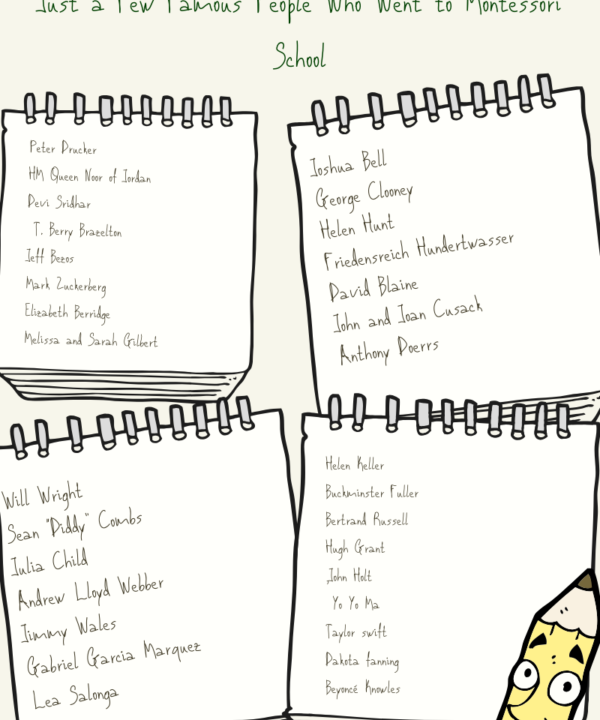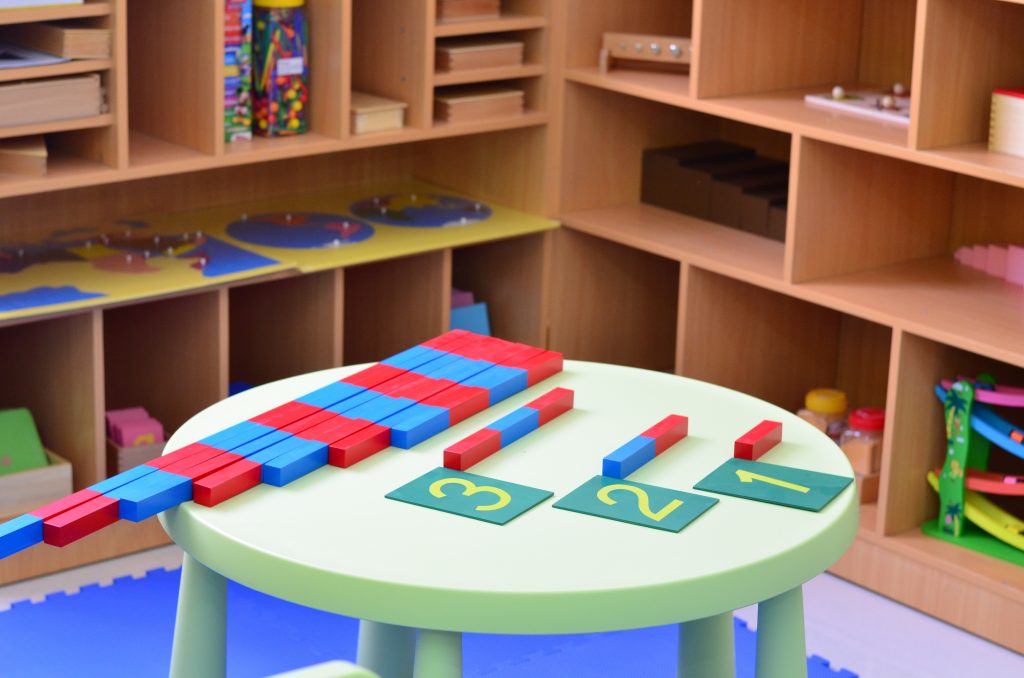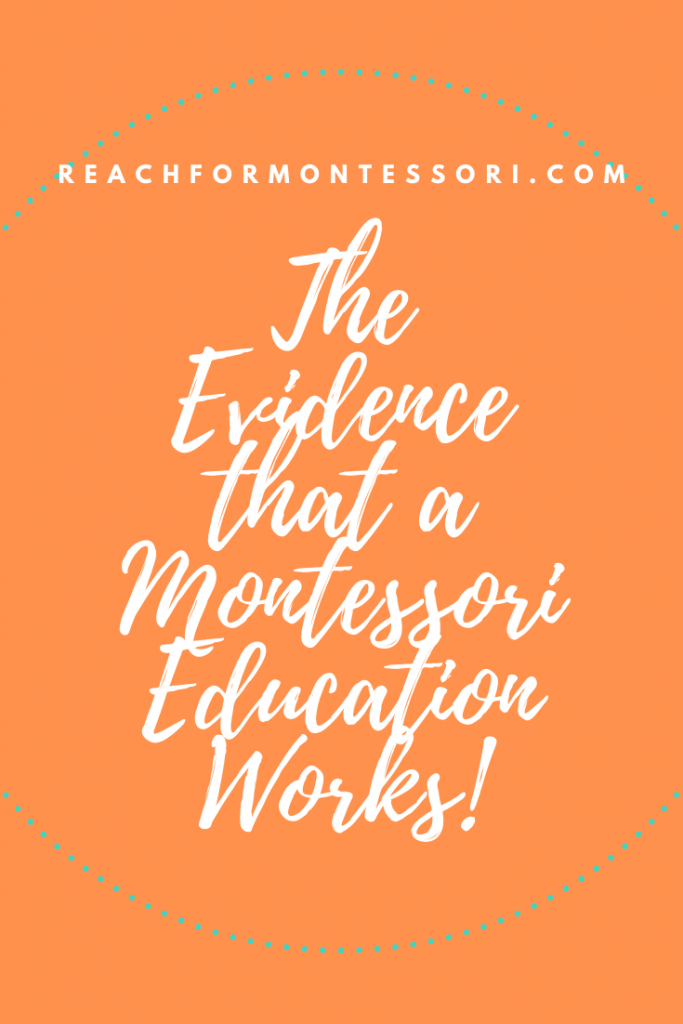Montessori Education works: The proof
So, we know how Montessori works. But is there any evidence that a Montessori education works better than a traditional education?
Well, there are the successful people who attended Montessori school at some point in their educational careers. Here is a list of just a handful of Montessori success stories:

That's quite a list! These folks are/were innovators and creative geniuses!
But this proves very little, if not, nothing at all. There are so many successful people who received no Montessori education at any point in their lives.
So, where is the evidence?
The actual evidence that a Montessori education works
This is major topic of conversation in the Montessori community! We know about the Montessori success stories, but where is the actual evidence that a Montessori education is better than traditional schooling?
I've done some extensive research (of the research) in this topic and I'm happy to share it with you! It turns out there are scientific studies that prove pretty conclusively that a Montessori, or Montessori-styled, education is the way to go!

There are several studies that prove Montessori learning, at any level, provides children with an academic edge!
The study featured below is longitudinal and showcases the differences academic achievement in children who attended Montessori vs. traditional schooling a full 5 years following children's transition from Montessori to traditional public schools.
“In essence,” the study found, “attending a Montessori program from the approximate ages of three to 11 predicts significantly higher mathematics and science standardized test scores in high school.
https://www.public-montessori.org/wp-content/uploads/2016/10/Outcomes_Milwaukee%20b.pdf
The below study focuses on math interventions utilizing manipulatives. If there is a doubt in your mind that the Montessori method of learning math is the best foundation for mathematical understanding, this is a must read.
The results of an attitude survey showed students improved in enjoyment, perceived knowledge, and confidence in solving multiplication problems.
https://www.public-montessori.org/wp-content/uploads/2016/10/Donabella_7th%20Grade%20Students%20Using%20Montessori%20Checkerboard.pdf

Below is a brief synopsis of a study that takes into consideration income levels and community diversity in students.
East Dallas Community Schools operates two inner-city Montessori schools that serve an ethnically and culturally diverse group of primarily low-income families. In over 30 years of using the Montessori approach to education, EDCS has proved that all children, regardless of race or income, can succeed in school when you start young and involve parents.
https://www.public-montessori.org/wp-content/uploads/2016/10/EDCS%20Outcomes%20Charts%20and%20Graphs.pdf
The following study is incredibly thorough and focuses on classic, well-implemented Montessori schools compared to schools who supplement traditional learning with Montessori activities. Public school outcomes are also used for comparison.
The author concludes that children that attend AMI Montessori schools perform well above the rest.
Angeline Lillard examines the impact of Montessori implementation fidelity. Her study found that children in classroom with high fidelity implementation showed significantly greater school- year gains on outcome measures of executive function, reading, math, vocabulary, and social problem-solving, than children in low fidelity or conventional classrooms.
https://www.public-montessori.org/wp-content/uploads/2016/10/Lillard%20%282012%29.pdf
Similar to the East Dallas Community Schools study, the study below factors in socioeconomics. Public Montessori programs and inner-city lottery Montessori school outcomes again show superior outcomes in many facets of education.
Researchers compared Montessori students with students in other school programs, and found that 5-year-old children who completed the three-year cycle in the Montessori preschool program scored higher on both academic and behavioral tests than the control group. The study also found that 12-year-old Montessori students wrote more sophisticated and creative stories and showed a more highly developed sense of community and social skills than students in other programs.
https://www.public-montessori.org/wp-content/uploads/2016/10/Lillard_science_article_9_29_2006.pdf
Another great study, this one comparing learning outcomes in children from traditional middle schools to children who attended Montessori middle schools.
This study compared middle school students in Montessori programs with students in traditional middle schools, and found significantly higher student motivation and socialization among the Montessori students. “There were strong differences suggesting that Montessori students were feeling more active, strong, excited, happy, relaxed, sociable, and proud while engaged in academic work. They were also enjoying themselves more, they were more interested in what they were doing, and they wanted to be doing academic work more than the traditional students.”
https://www.public-montessori.org/wp-content/uploads/2016/10/Rathunde_Comparison%20of%20Montessori%20and%20Traditional%20MiddleSchools-small.pdf
The following is a thorough study and not entirely specific to Montessori (though Montessori students were sampled).
To be successful takes creativity, flexibility, self-control, and discipline. Central to all those are executive functions, including mentally playing with ideas, giving a considered rather than a compulsive response, and staying focused. This review compares research results from various activities and curricula that have been shown to improve children’s executive function, including computerized training, aerobic exercise, martial arts and mindfulness practices, and classroom curricula including Montessori education. In a comparison of curricula and curricula add-ons, the Montessori approach is shown to meet more criteria for the development of executive function for a more extended age group.
https://www.public-montessori.org/wp-content/uploads/2016/10/Diamond_science_interventions_%202011.pdf
This is commentary, and not specific to Montessori learning, but it is a must-read if you want a better understanding of why Montessori schooling is more effective than traditional education programs.
Not only does the author explain how children learn best, but she goes into the obstacles to learning that are present in traditional classrooms, such as stress, isolation, and data-driven measures of academic success.
Dr. Adele Diamond, Professor of Developmental Cognitive Neuroscience at the University of British Columbia, is one of the world’s leading researchers on the development of cognitive function and a supporter of Montessori education. In this article she discusses effective strategies for advancing academic achievement, and advises: “Programs that address the whole child (cognitive, emotional, social and physical needs) are the most successful at improving any single aspect – for good reason. For example, if you want to help children with academic development, you will not realize the best results if you focus only on academic achievement (though at first glance doing that might seem the most efficient strategy); counterintuitively, the most efficient and effective strategy for advancing academic achievement is to also nurture children’s social, emotional, and physical needs.”
https://www.public-montessori.org/wp-content/uploads/2016/10/Diamond_-_Evidence…Outcomes…Whole_Child.pdf
So, are these Montessori success stories proof that parents who can afford, or who are motivated to find free or affordable Montessori programs, tend to do better or be more involved with their children at home? Or does all this prove that Montessori schools do the trick when it comes to education?
With the upcropping of public and charter Montessori schools granting access to a Montessori education even for the working and struggling classes, time will give us a more definitive answer.
For now, though, the evidence we have tells us that a Montessori education works! Each study and commentary listed in this posts does corroborate the findings of the others'.
One thing is certain, though. Traditional education is proving to be flawed and cuts to recess time and the arts are not helping matters. Neither is the shift to technology-based learning.
Children learn best through experiences, not by sitting still at a desk or using educational apps.
I'd love to get some feedback on this!
Cheers and don't forget to subscribe!

This is so interesting! A child’s education is so important. I have always heard good things about the Montessori education.
I completely agree that children learn best from experiences, especially those who have a more difficult time focusing in general. The research on the Montessori style of learning is quite interesting! Thank you for sharing.
I couldnt agree more. My children were brought up with Montessori teaching. I am a firm believer that it works!
I agree that Montessori schools are a good choice if you’re able to have one close to you that you are able to have your kids attend.
Education is so important for a childs future!! This is a great article. Thanks for Sharing
How interesting!! This is very informative and cool to read about!
This is a great summary of the benefits of montessori
I actually want to try the Montessori teaching!
We did not do Montessori for our kids, but our school uses many of its methods. And we have friends who have chosen Montessori schools and have been SO happy!
Wow this is really interesting stuff and it looks assuring. Thank you for the info!
I don’t have children so I am not very familiar with the Montessori system. I did hear about it. I grew up with the traditional learning methods and I agree that they have so many flaws.
We are very lucky to have two fantastic Montessori schools close by to us. They are fantastic schools.
As a teacher I’m always looking for new things to learn in the realm of education. Montessori really seems to be a good approach!
My sister is a teacher and it’s very frustrating for her not to be able to implement many Montessori practices into her classroom. I hope you have better luck!
Wow.. I hadn’t the faintest idea the two teaching methods were so different.. Thank you, this article has been a real eye-opener since I am planning to send my 20 months old to pre-school next year.
I have always wondered about this! Thank you for sharing this information.
enjoyed my read here & appreciate your info sharing, definitely helpful to ypung parents.
learnt a lot to plan with my sis in law for my little niece
cheers, siennylovesdrawing
I would love to put my son in Montessori but it’s very expensive where I live. It’s a great meathid!!
It can be quite expensive if you don’t live near a public or charter Montessori School.
It’s a huge downside to Montessori! Dr. Montessori would roll over in her grave if she knew the tuition Montessori Schools charge!
Yeah. I looked into part time Montessori for my two younger children so I could work on a project for my website and my mind was blown. I don’t even want to tell you how much they quoted me!
This is really an interesting fact. I don’t have a kid yet, so planning about education has not yet entered my mind. But it’s good to know about how Montessori works.
Hm, we don’t have kids just yet, but this is worth considering for down the road!
Montessori is a great option!